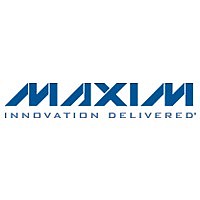MAX17499 Maxim Integrated Products, MAX17499 Datasheet - Page 12

MAX17499
Manufacturer Part Number
MAX17499
Description
(MAX17499 / MAX17500) Current-Mode PWM Controllers
Manufacturer
Maxim Integrated Products
Datasheet
1.MAX17499.pdf
(18 pages)
w
w
w
.
D
a
t
a
S
h
e
circuit in Figure 6, calculate the output voltage using
the following equation:
where N
is the number of tertiary winding turns, and both V
and V
The current-sense resistor (R4 in Figure 1), connected
between the source of the MOSFET and ground, sets the
current limit. The current-limit comparator has a voltage
trip level (V
culate the value of R4:
where I
transformer, which also flows through the MOSFET.
When the voltage produced by this current (through the
current-sense resistor) exceeds the current-limit com-
parator threshold, the MOSFET driver (NDRV) termi-
nates the current on-cycle within 60ns (typ). Use a
small RC network to filter out the leading-edge spikes
on the sensed waveform when needed. Set the corner
frequency between 2MHz and 10MHz.
The bypass capacitor at IN, C1, supplies current imme-
diately after the MAX17500 wakes up (see Figure 1).
The size of C1 and the connection configuration of the
tertiary winding determine the number of cycles avail-
able for startup. Large values of C1 increase the start-
up time but also supply gate charge for more cycles
during initial startup. If the value of C1 is too small, V
drops below 9.74V because NDRV does not have
enough time to switch and build up sufficient voltage
across the tertiary output, which powers the device.
The device goes back into UVLO and does not start.
Use a low-leakage capacitor for C1 and C2.
Typically, offline power supplies keep startup times to
less than 500ms even in low-line conditions (85V AC
input for universal offline or 36V DC for telecom appli-
cations). Size the startup resistor, R1, to supply both
e
Current-Mode PWM Controllers with
Programmable Switching Frequency
12
t
.
c
o
.
______________________________________________________________________________________
Startup Time Considerations for Power
k
D2
r
PRI
V
S
are the diode drops at the respective outputs.
OUT
is the number of secondary winding turns, N
is the peak current in the primary side of the
CS
=
) of 1V. Use the following equation to cal-
Applications Information
N
N
Supplies Using the MAX17500
S
T
⎡
⎢
⎣
⎛
⎝ ⎜
1
R
+
4 =
R
R
2
1
⎞
⎠ ⎟
V
I
PRI
CS
V
REF
+
V
D
Current Limit
6
⎤
⎥ −
⎦
V
D
2
D6
IN
T
the maximum startup bias of the device (90μA) and the
charging current for C1 and C2. The bypass capacitor,
C2, must charge to 9.5V and C1 to 24V, all within the
desired time period of 500ms. Because of the internal
soft-start time of the MAX17500 (approximately 5.6ms
when f
deliver current to the device for at least this much time.
To calculate the approximate amount of capacitance
required, use the following formula:
where I
(2mA) after startup, Q
Q1, f
(350kHz), V
(approximately 12V), and t
time (5.6ms).
Example: I
Choose a 2.2μF standard value (assuming 350kHz
switching frequency).
Assuming C1 > C2, calculate the value of R1 as follows:
where V
the application (36V for telecom), V
strap UVLO wake-up level (23.6V max), and I
the IN supply current at startup (90μA max).
For example:
Choose a 61.9kΩ standard value.
SW
SW
IN
IN(MIN)
C
is the MAX17500’s switching frequency
= 350kHz), C1 must store enough charge to
G
1
is the MAX17500’s internal supply current
R
=
= (8nC) (350kHz) ≅ 2.8mA
1
HYST
I
≅
(
C1
2
is the minimum input supply voltage for
mA
( .
R
0 105
=
1
C
I
is the bootstrap UVLO hysteresis
≅
(
(
G
+
I
24
36
1
C
V
1
(
2 8
=
=
500
IN MIN
V
mA
GTOT
V
.
12
=
Q
I
(
)( .
) (
C
I
(
IN
mA
− 4 4
GTOT SW
V
1
2 2
(
V
) (
ms
500
SUVR
+
+
V
+
2
)( .
HYST
)
SS
I
μF
is the total gate charge for
)
I
S
G
90
5 6
−
ms
T T ART
V
)(
)
f
V
)
C
μA
is the internal soft-start
t
SUVR
=
ms
)
SS
1
0 105
)
)
)
.
=
=
61 5
SUVR
2 24
mA
.
.
k
Ω
μF
is the boot-
START
is
D
a
t
a
s
h
e
e
t












